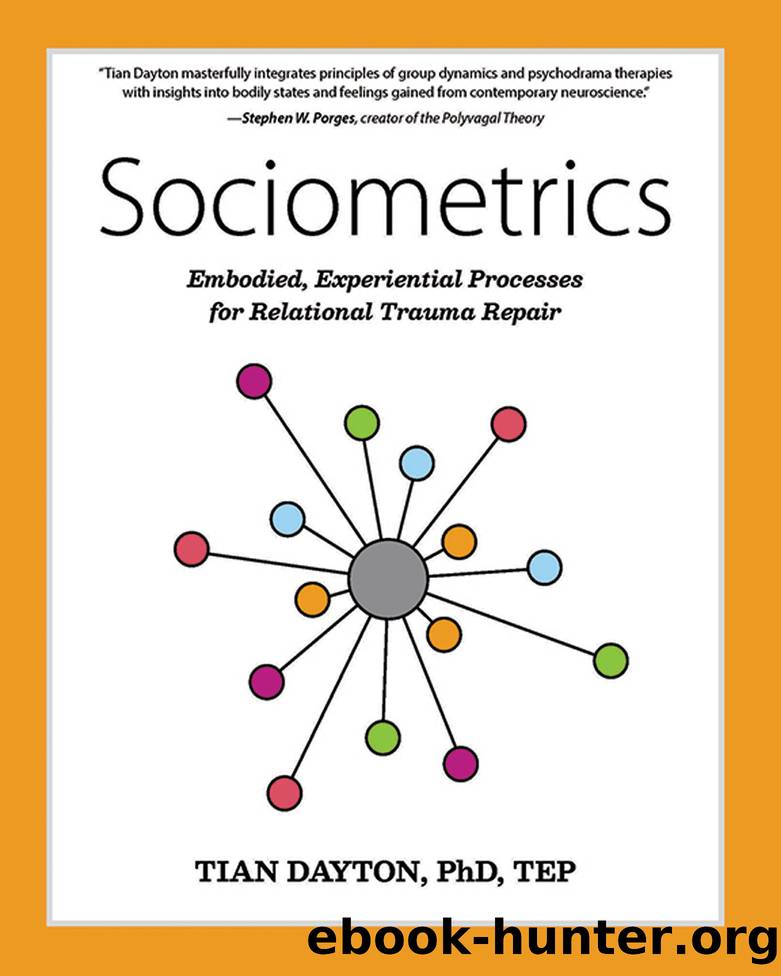Sociometrics by Dayton Tian;

Author:Dayton, Tian;
Language: eng
Format: epub
Publisher: Central Recovery Press, LLC
To Review the Process and History a Bit
If you only add floor checks and timelines to your work, you will have added an experiential component to programming that will change your work and the experience of your groups. You will find that your groups are on their feet, grounded in the room, making choices, and engaging and bonding with each other. For this reason, I want to go over my thinking behind floor checks so that they will be fully understood.
First, in creating them, as a therapist, I had to let go of the notion that healing had to come from me. To do this I used what I knew well: Morenoâs process of experiential healing and Montessoriâs processes of experiential learning. I also incorporated the ideas of healing through identification and sharing, core to twelve-step programs and the idea of mammalian limbic resonance present in all groups, including groups of animals.
Maria Montessori was a pioneer in turn-of-the-century Vienna, as were Moreno and Freud. She was the first woman doctor of her time; she was given children to teach who were thought to be unteachable in a poor section of the town, much like Moreno found work with prostitutes. She taught them to read, write, and do math, which was seen as remarkable, thus breaking down the stereotypes of her time. Montessori developed the idea of a prepared learning environment, in which there were learning materials created for children and they were free to choose what they wanted to work on at any given moment. She believed children went through âsensitive periodsâ in their learning and that they needed to access learning materials that were right for them at those times. I feel that recovery is a sensitive period for learning life and emotional processing skills, and treatment centers are like recovery schools. The role of the teacher in Montessoriâs classroom is to act as a catalyst between the child and the environment or the learning materials. It was an enlightened, efficient, and practical approach that allowed her to work with large groups of children.
Adapting her ideas, I saw my prepared environment as the research-based floor cards, which became the learning materials, and the therapistâs role was to act as a catalyst between the clients and the learning materials and to keep the process safe and moving.
Twelve-step communities are all about healing through this kind of connection by sharing our âexperience, strength, and hopeâ with like-minded people. Groups are divided into categories that are essentially sociometrically aligned according to âissuesâ or subject matter. There are separate groups for alcohol addiction, drug addiction, food issues, compulsive sexual activity, money issues, codependency, and so on. Family members of addicts can also find groups of people who are going through what they are going through. These groups are profoundly healing, are easily accessed, and can be part of ongoing healing and creating a new design for living. Twelve-step work had taught me, a day at a time, about the powerful healing forces at work in a group of like-minded people.
Download
This site does not store any files on its server. We only index and link to content provided by other sites. Please contact the content providers to delete copyright contents if any and email us, we'll remove relevant links or contents immediately.
Should I Stay or Should I Go? by Ramani Durvasula(7644)
Why We Sleep: Unlocking the Power of Sleep and Dreams by Matthew Walker(6691)
Fear by Osho(4724)
Flow by Mihaly Csikszentmihalyi(4683)
Rising Strong by Brene Brown(4444)
Why We Sleep by Matthew Walker(4429)
The Hacking of the American Mind by Robert H. Lustig(4368)
How to Change Your Mind by Michael Pollan(4348)
Too Much and Not the Mood by Durga Chew-Bose(4333)
Lost Connections by Johann Hari(4168)
He's Just Not That Into You by Greg Behrendt & Liz Tuccillo(3876)
Evolve Your Brain by Joe Dispenza(3661)
The Courage to Be Disliked by Ichiro Kishimi & Fumitake Koga(3477)
Crazy Is My Superpower by A.J. Mendez Brooks(3388)
In Cold Blood by Truman Capote(3374)
Resisting Happiness by Matthew Kelly(3335)
What If This Were Enough? by Heather Havrilesky(3302)
The Book of Human Emotions by Tiffany Watt Smith(3289)
Descartes' Error by Antonio Damasio(3268)
